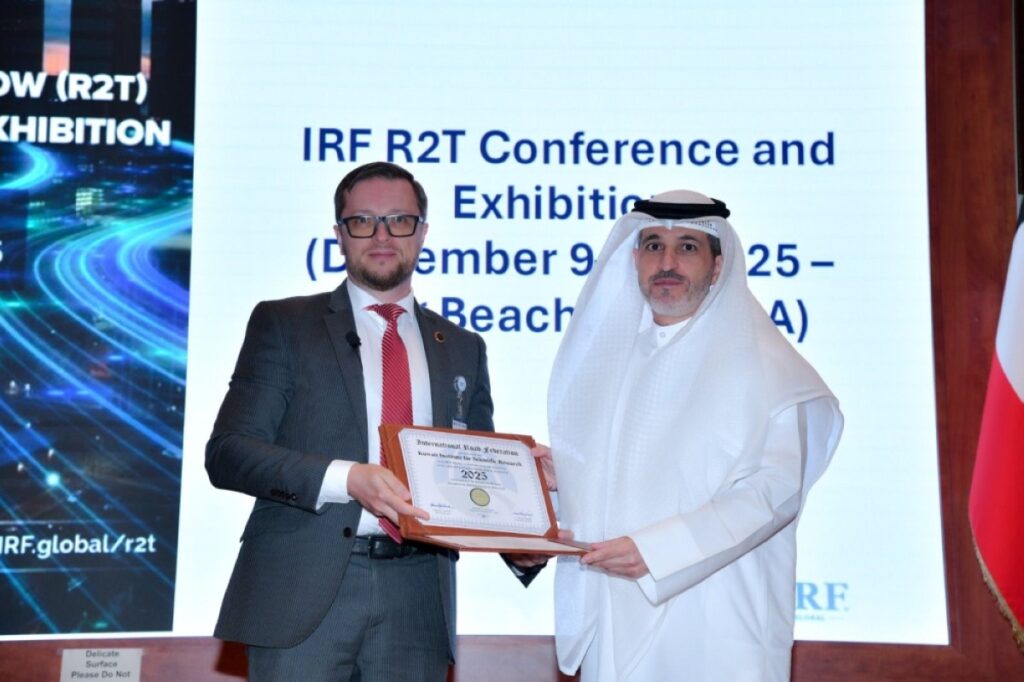KUWAIT: Kuwait Institute for Scientific Research (KISR) held “The Road Sustainability Forum: Present Challenges and Future Prospects” in collaboration with Kuwait Foundation for the Advancement of Sciences (KFAS), on Sunday. During his speech, Dr Faisal Al-Humaidan, Director General of KISR, affirmed that the Institute places great importance on supporting the transition toward sustainable development. This is achieved through its pioneering projects, which have made the Resource Sustainability and Recycling Program, aimed at environmental protection, a key component of its Tenth Strategic Plan, currently being implemented across all research centers.
He added, “The Institute is proud to have joined the International Road Federation (IRF), as this membership provides access to global expertise networks, strengthens international cooperation, and supports the adoption of modern best practices in road design and maintenance. This step is pivotal in advancing the ambitious goals of Kuwait’s Development Vision 2035.”
Al-Humaidan pointed out that this forum reflects the Institute’s commitment to supporting the efforts of the state and its institutions, foremost among them the Ministry of Public Works, to develop infrastructure in accordance with the highest international standards, while leveraging modern technologies and sustainable practices to enhance the quality and efficiency of road networks.

Group photo of speakers and participants.
For her part, Dr. Fotouh Al-Ragom, Acting Executive Director of the Energy and Building Research Center, explained that the Research Center, in alignment with the Institute’s Tenth Strategic Plan, is working to develop innovative solutions that strengthen road durability and extend their service life, explaining that in recent years, the Center has completed numerous research projects in advanced pavement materials, thermal stress simulation, and the development of nano-enhanced asphalt composites, in addition to designing predictive models that support government agencies in decision-making and prioritizing maintenance.
She emphasized that the Institute’s membership in the International Road Federation represents a major step forward in international cooperation. It grants access to leading expertise, global training platforms, and internationally recognized evaluation systems. She noted that this forum is the first tangible outcome of this membership and opens the door to broad joint programs that will undoubtedly contribute to advancing Kuwait’s road systems on modern scientific foundations. In his turn, Aliaksander Smirnou, IRF Global Director for the Middle East and North Africa, emphasized that IRF Global is proud to partner with an institution that combines scientific excellence with national impact, affirming that the collaboration will continue expanding through innovation-driven, future-ready initiatives.
He added that Kuwait’s participation in IRF Global activities has grown steadily, highlighting KISR’s recent membership within IRF Global and cooperation advanced, noting Kuwait’s emerging role in regional mobility transformation. The visit follows previous engagements, including discussions with Dr Noura Mohammed Al-Mashaan, Minister of Public Works. He continued, “One of the main highlights this year for IRF was the meeting with the Ministry of Public Works, the Kuwait Public Authority for Roads & Transportation (PART), and the Kuwait Institute for Scientific Research which joined as a member in July followed by the workshop in Kuwait with KISR, ‘Road Sustainability Forum: Present Challenges and Future Prospects,’ held in November.”
On IRF Global and its expanding regional role, he said that it was founded in 1948 and it is a nonprofit organization dedicated to road and transport infrastructure development. Now entering its 77th year, IRF provides technical expertise, policy advocacy, capacity building, and professional training for governments, universities, NGOs, and private-sector stakeholders. Its motto, “Better Roads for a Better World,” guides more than 70 countries engaged in IRF programs.
He noted, “IRF’s membership includes road authorities, research institutions, engineering firms, and mobility technology providers. KISR’s induction this year marked a significant addition to the network.” He indicated that the IRF MENA Regional Committee continues to expand, including new sustainability-focused subcommittees and stronger GCC representation, adding “IRF’s technical work is anchored in flagship committees that cover the core pillars of modern transport infrastructure: road safety, asset management, intelligent transport systems, sustainable pavements, procurement and alternative financing, and road user charging.
These committees drive specialized task forces focused on emerging priorities such as AI-driven safety solutions, roadside performance standards, and sustainable financing models.” IRF Global plays a major role in capacity building through certified programs, specialized training, and a catalog of more than 50 professional courses tailored to regional needs across the GCC and beyond. Its partnerships with over 30 international universities, now including Kuwait through KISR, create pathways for research collaboration, fellowships, and continuous professional development.
He concluded that the Federation reaffirmed its commitment to supporting Kuwait’s sustainable mobility goals, emphasizing that KISR’s membership will enhance national access to global best practices, innovation networks, and future-ready transport solutions. The forum brought together experts, engineers, and stakeholders to exchange knowledge and explore practical solutions aimed at advancing road sustainability in Kuwait. The event also highlights KISR’s membership in the International Road Federation (IRF), which expands opportunities for international cooperation, capacity building, and access to global best practices.

